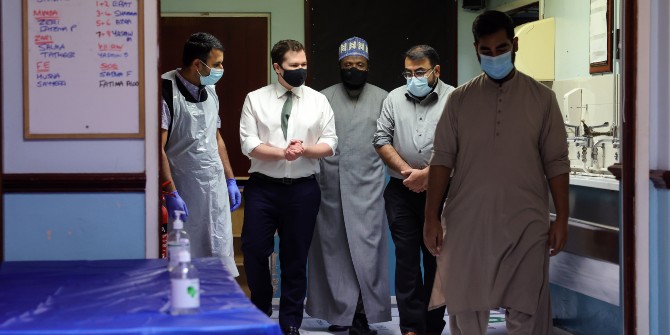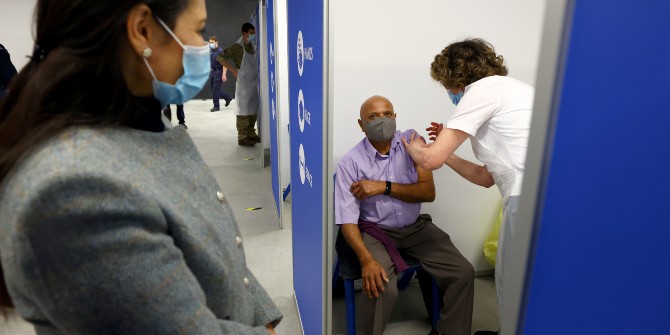Children and young people with chronic conditions have faced delays in seeing a GP and getting a diagnosis and treatment during the pandemic. Lockdowns and the switch to virtual appointments made it harder for health professionals to identify problems. Jenny Greenwood (King’s College London) and Sapfo Lignou, (project lead, University of Oxford) warn that the NHS needs to understand the impact the pandemic has had on younger patients.
How has the UK’s response to COVID affected children with chronic conditions?
When COVID-19 emerged in the UK in March 2020, and as cases rose dramatically over the following weeks, NHS England was under pressure to deal with the vast numbers of patients admitted with the virus. There was large-scale redeployment of staff into adult services, and primary care practitioners were instructed to conduct remote triaging. The government issued instructions to the public to remain at home wherever possible and people considered clinically vulnerable were told to shield. The combination of prioritising the emergency response to COVID and government guidance to the public had a significant effect on the way children with chronic conditions and their caregivers sought and accessed care.
This report summarises the results of an AHRC-funded project, ‘Children, acceptable health risks and COVID-19: Ethical guidance for a fair policy response’, a collaboration between University of Oxford, KCL and NHS child health specialists.
Access to care
There was a significant decline in the number of people seeking and access care from their GP. Those that did try to contact their surgery reported having difficulties getting hold of their GP as well as trouble acquiring prescriptions. There was also a decrease in the number of children presenting at A&E. Health professionals reported concerns about the potential for delayed or missed diagnosis of disease in children; delays in diagnosis of diabetes and cancer are particularly serious. In the cases where children were diagnosed with new conditions, many investigations were conducted without the usual procedures, such as patients with inflammatory bowel disease who were diagnosed without an endoscopic assessment because of the dramatic reduction of endoscopies in centres across the UK.

Disease severity
As well as delays or missed diagnoses, there was also a worrying increase in disease severity amongst children and young people (CYP) with chronic conditions. Those with epilepsy experienced more regular and severe seizures, which practitioners believe could be due reduced access to health professionals, difficulties accessing medicine, and the stress and sleep problems associated with the pandemic. Interestingly, some reports claimed that children with asthma experienced a decrease in symptom severity, likely due to reduction in air and road traffic, restricted travel, shielding and social distancing. This view was contradicted by one consultant in paediatric medicine who took part in the research, who said that while many people with asthma experienced less severe symptoms there is a subgroup of complex patients whose conditions got dramatically worse. These patients often also had additional difficulties such as breathing pattern disorder, anxiety, social inequality and safeguarding issues. For these patients virtual appointments were not effective in picking up deteriorating health or family disengagement, according to this consultant.
Telemedicine
As has been widely reported, one of the most significant changes to the healthcare system is in the introduction of virtual appointments, which has been widely used for the care of children with chronic conditions including asthma, diabetes and neurodevelopmental conditions. It has been critical for CYP with mental health difficulties who otherwise would not have had access to their usual psychological support.
While the use of virtual appointments improved access for many families, reliance on a family’s ability to access technology perpetuated existing health inequalities. Some neurodiverse children, particularly those with autism spectrum conditions, found virtual appointments difficult to access and parents have reported that these appointments did not meet their needs. Healthcare professionals were put under pressure to maintain virtual appointments for a significant number of patients, which many believe is suboptimal and will increase the risk of harm to young people. One consultant said that it is not always easy to predict which children or young people will be most affected by the loss of face-to-face care. Reliance on telemedicine may have resulted in missed or delayed diagnoses which could have a serious impact on child health.
Safeguarding
Serious concerns have been raised about the impact of the pandemic restrictions on the safeguarding of children and young people. There is a serious risk to children who experienced maltreatment or domestic violence unknown to professionals because of reduced or non-existent access to education and social care professionals. The lack of contact with those people usually providing care for a child is additionally worrisome for children with chronic health conditions who are more likely to experience psychosocial difficulties. Some health professionals raised concerns that, with the closure of schools, the move to virtual health visiting and increasing reluctance to seek healthcare on the part of parents, safeguarding referrals would drop. It has become apparent in the months since that this was indeed the case.
Why is this important?
Evidence suggests a serious issue in how CYP and their needs have been neglected during the pandemic in favour of prioritising the COVID response. This unmet need will already have caused increased disease severity and greater health risk in children across various physical and mental health conditions. Although telemedicine helped meet the needs of many children, language barriers, disability, neurodiversity and digital disparities means many populations have been under-served.
What needs to be done?
Greater consideration of the needs of children is required, particularly when evaluating NHS England’s response to the pandemic. There is a relatively small number of studies exploring the impact of health systems changes on children during the pandemic, and this points to a wider bias in healthcare planning and the development of information technology. Understanding the impact of the health system changes on paediatric patients is a vital step towards a more effective and equitable health system response to future emergencies.
For more details on the research that informs this article see: Lignou et al. Changes in healthcare provision during COVID-19 and their impact on children with chronic illness: A scoping review. Inquiry: The journal of healthcare organisation and planning 2022. Our findings will inform a further piece of work designing an ethical framework that considers the needs of CYP with chronic illness in the prioritisation processes required in the pandemic context and beyond. See also the project webpage Children, acceptable health risks and Covid-19 — Ethox Centre.
This post represents the views of the authors and not those of the COVID-19 blog, nor LSE.





